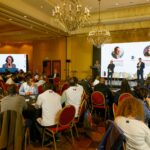This year, given the health situation, the General Meeting of the Education and Solidarity Network was held remotely in contrast to the usual procedure. In such special circumstances, ESN members were keen to “meet” by videoconference, to exchange news and maintain links despite the distance! On the agenda of the discussions: news, Network projects & the life of the association.
This year, given the health situation, the General Meeting of the Education and Solidarity Network was held remotely in contrast to the usual procedure. In such special circumstances, ESN members were keen to “meet” by videoconference, to exchange news and maintain links despite the distance! On the agenda of the discussions: news, Network projects & the life of the association.
In the context of its General Meeting which took place online from 19 to 26 June 2020 by e-mail, the ESN proposed a time for a videoconference to encourage the exchange of news between its members and to answer questions concerning the items on the agenda.
At the beginning of the session, Matthias Savignac, President of the Network, made a point of thanking the members for mobilising and for their interest in the ESN, all the more so in this unusual situation. He highlighted the resilience of member organisations, trade unions, health mutuals, associations and other civil society organisations, which, in the face of a crisis with multiple and disastrous consequences, were able to mobilise, adapt and innovate to best meet the needs of their members and beneficiaries throughout the world. His introduction reminded everyone of the ESN’s objectives: to maintain a space for exchange and communication, to be a catalyst for innovative projects, to feed a pool of expertise that can be called upon to support various projects all over the world, and to unite people around the subjects of health, education, social protection and the social and solidarity economy.
The videoconference made it possible to review the ESN’s actions in 2019 and 2020, the Network’s new projects, including the Country Focus study visits and the creation of a Barometer on the health and well-being of education professionals. The administrative and statutory aspects of the association were also discussed.
Network members’ discussions made it possible to address the consequences of the pandemic on their organisations, the actions of civil society and social and solidarity economy actors to tackle the crisis, and the need and urgency to continue to raise the subjects of education, health and social protection at the international level.
-
Gary Phoebus (NEA Member Benefit, USA) stressed that the ESN and its values have never been as relevant as they are now. He shared uncertainties surrounding the conditions in reopening schools in the United States, including the value of providing mental health services to enable people to cope with the stress and ambiguity of the current situation.
-
Abdelaziz Alaoui (Caisse Mutualiste Interprofessionnelle Marocaine, Morocco) discussed the changing paradigms following the pandemic, including the role of health and SSE actors.
-
Sofia El Yousfi (Adosen, France) presented an Adosen tool developed to prepare for lockdown ending and the reopening of schools. These comic strips, which enable young people to learn about protective measures, such as washing their hands, wearing masks, etc., have been widely used in France, both within establishments and in families.
-
Cliff Southcombe (Social Enterprise International, UK) outlined their initiative to form a consortium of actors to respond to the European Social Catalyst Fund’s call for proposals for a project focusing on the creation of “FairShares” social enterprise schools, using the LocoSoco and Nemesis methodology.
-
Augustin Tumba (FENECO, DRC) described his union’s actions ahead of the reopening of schools, the lack of social dialogue and the few preventive measures planned in schools to deal with the pandemic.
-
Florian Perrudin (Essentiel, France) called for a second wave of solidarity and recalled that this situation is also an opportunity for the Network to strengthen advocacy for Universal Health Coverage.




